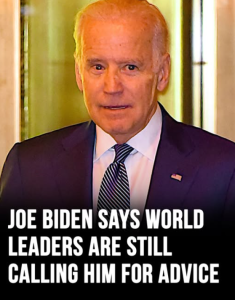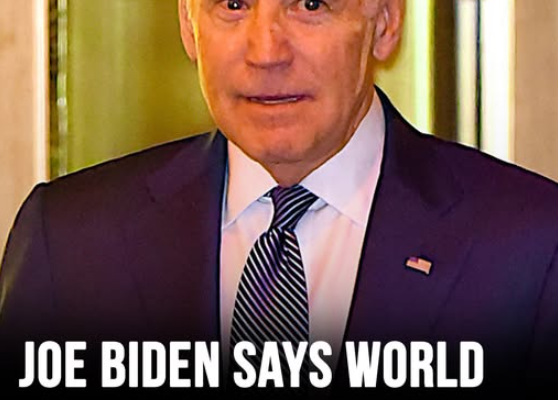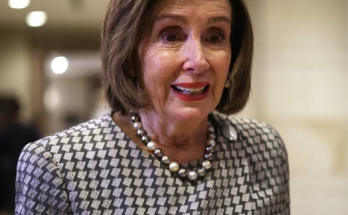
Joe Biden Says World Leaders Still Stand United: A Message of Resolve Amid Global Challenges
In a world marked by rapid change, political tension, and mounting uncertainty, President Joe Biden has once again reaffirmed the strength and unity of the global alliance. Speaking from the White House earlier this week, Biden delivered a message of determination and cooperation, insisting that “world leaders still stand together” — a declaration that carries weight as nations face an array of challenges, from international conflict and climate crises to economic volatility.
A Message of Steadfast Leadership
President Biden’s remarks came at a time when the world is grappling with pressing issues that test the bonds between allies. With wars, humanitarian crises, and shifting power dynamics shaping global headlines, Biden sought to reassure both Americans and the international community that the Western alliance remains firm.
“Despite the noise, despite the disagreements, despite the chaos in some corners of the world,” Biden said, “our commitment to democracy, human rights, and peace is unshaken. The world’s leading nations still believe in the power of unity — and we’re proving it every single day.”
It was a statement not just of reassurance, but of strategic intent. The President aimed to remind both allies and adversaries that partnerships formed in trust and shared values are not easily broken — even in moments of global tension.
Strengthening Alliances in a Fractured World
Over the past several years, the Biden administration has placed renewed emphasis on rebuilding global alliances, particularly those strained in previous years. His foreign policy team has worked diligently to reestablish America’s role as a collaborative force — one that values dialogue, diplomacy, and shared leadership.
Biden highlighted the importance of key alliances such as NATO, describing it as “the cornerstone of global stability.” He noted that, despite pressures from rising authoritarian powers, NATO remains “stronger and more unified than ever.” Recent defense summits have reaffirmed commitments from member nations to mutual protection and coordinated security measures.
“From Europe to the Pacific, we’re standing shoulder to shoulder,” Biden stated. “Our allies know that when we stand together, no challenge is too great — no aggressor too powerful.”
A Focus on Global Security and Peace
Much of Biden’s address focused on global security, particularly the ongoing conflicts that have drawn international concern. Without naming specific adversaries, he underscored the importance of deterrence, dialogue, and diplomacy.
He emphasized that while military strength is essential, peace through partnership remains the ultimate goal. “True power,” Biden said, “doesn’t come from domination. It comes from cooperation. It comes from nations choosing stability over chaos, compassion over cruelty, and understanding over division.”
His words were met with cautious optimism by many world leaders, who continue to seek common ground on issues such as nuclear proliferation, cybersecurity, and global health preparedness. Biden’s approach blends traditional diplomacy with a clear recognition of modern realities — a balance between firmness and flexibility.
The Economy: A Shared Responsibility
Beyond security, Biden also touched on the global economy, acknowledging the ripple effects of inflation, trade disruptions, and supply chain instability. He urged cooperation among leading economies to strengthen international markets and reduce inequality.
“The global economy is not a zero-sum game,” Biden said. “When our partners thrive, America thrives too. We’re working together to make sure economic growth is sustainable, fair, and inclusive.”
To that end, the administration continues to push for coordinated efforts among G7 and G20 nations to address debt relief for developing countries, invest in green energy, and promote fair trade practices.
Climate and Humanitarian Cooperation
Perhaps the most urgent and universal challenge Biden addressed was climate change. He called it “the defining issue of our time,” warning that no country can solve it alone. Biden reaffirmed America’s commitment to the Paris Agreement, pledging continued investment in renewable energy, conservation, and international aid for countries most affected by climate disasters.
He emphasized the need for innovation, cooperation, and accountability, stating: “Every nation has a role to play. The choices we make today will determine the health of our planet tomorrow. And the world’s leaders — still united — are choosing action.”
His comments come as several countries face extreme weather events, from record-breaking heatwaves to catastrophic floods. Biden’s push for global environmental cooperation reflects both a moral and economic priority, aligning with his administration’s broader agenda of clean energy expansion and job creation.
Democracy and Shared Values
A recurring theme throughout Biden’s message was the defense of democracy. At a time when populist movements and authoritarian regimes are testing the resilience of democratic institutions worldwide, Biden framed unity among world leaders as essential to preserving freedom and self-determination.
“The greatest strength of democracies is their ability to adapt, to listen, and to lead with compassion,” he said. “We may not agree on every policy, but we share the same belief — that people, not power, should shape the future.”
He underscored ongoing efforts to counter misinformation, protect electoral integrity, and support free press initiatives worldwide. His administration has partnered with numerous countries to safeguard democratic values through education, technology, and open dialogue.
Challenges Ahead
Still, Biden acknowledged the difficulties that lie ahead. Global cooperation, he admitted, does not come without friction. “There will always be differences — of opinion, of interest, of ideology,” he said. “But we can’t afford to let those differences divide us when the stakes are so high.”
He pointed to ongoing diplomatic tensions in Eastern Europe, trade disputes in Asia, and humanitarian crises in Africa and the Middle East as reminders that unity requires persistence and patience. Yet, his message remained one of cautious optimism — that shared purpose can overcome even the deepest divides.
The Human Side of Leadership
Perhaps the most powerful moment came when Biden spoke not as a politician, but as a man who has witnessed decades of global transformation. “I’ve met with presidents, prime ministers, and everyday citizens across the world,” he said. “And what I’ve learned is simple — people everywhere want the same thing: safety, dignity, and hope for their children. That’s what binds us together. That’s what keeps us moving forward.”
His words resonated deeply, not only because of their sincerity, but because they captured the heart of his message — that leadership is not about dominance, but connection.
Looking Toward the Future
As the world enters a new era of technological advancement and geopolitical uncertainty, Biden’s declaration that “world leaders still stand united” serves both as reassurance and a call to action. His administration’s focus on rebuilding trust, fostering collaboration, and promoting shared prosperity may not solve every global issue overnight — but it signals a belief that cooperation is still possible, even in divided times.
In closing, Biden offered a message of resilience: “History will remember this moment — not for the challenges we faced, but for how we faced them together. The world’s leaders still stand united, and as long as we do, there’s nothing we can’t overcome.”

